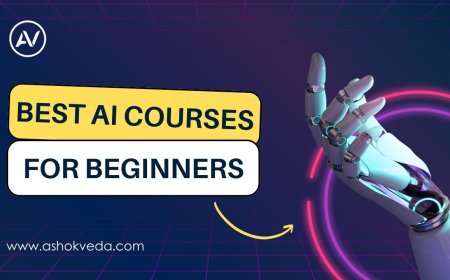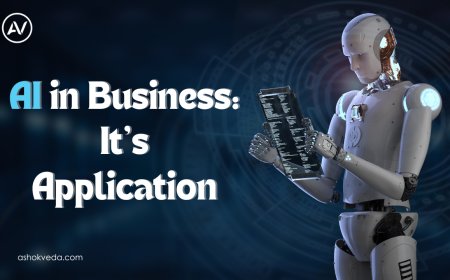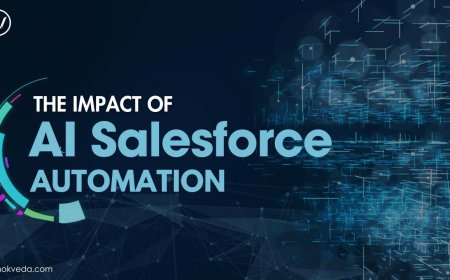AI and the Future of Work
Learn about the integration of artificial intelligence in various industries and its influence on job roles and workforce dynamics

Artificial Intelligence (AI) has revolutionized various industries by leveraging machine learning and data processing. It serves as a game-changer, automating repetitive tasks, streamlining processes, and providing valuable data insights. In the healthcare sector, AI assists in accurate diagnosis and treatment recommendations. Financial institutions heavily rely on AI to assess risks and detect fraudulent activities. The manufacturing industry benefits from AI-driven automation, while retailers utilize AI to personalize customer experiences. Moreover, the transportation sector looks to AI for the development of autonomous vehicles. These applications not only boost efficiency but also pave the way for a future where AI continues to redefine work, making it smarter, data-driven, and remarkably efficient.
AI's potential is extensive, leading to a widespread interest in its capabilities across various sectors. Understanding the applications and implications of AI is crucial for businesses, researchers, and tech enthusiasts seeking to harness its advantages.
Here's a more detailed look at the different types of AI and some tips for successful adoption:
Types of AI:
- Machine Learning: This allows systems to learn from data and improve their performance without explicit programming. It's a powerful tool for tasks like predictive analysis and pattern recognition.
- Natural Language Processing (NLP): NLP enables computers to interact with human languages, making tasks like language translation and sentiment analysis possible. It's the technology behind voice assistants and chatbots.
- Computer Vision: With computer vision, machines can interpret and understand the visual world. This enables applications like image recognition and video analysis, which have numerous practical uses.
- Robotics: By integrating AI with mechanical systems, robotics automates tasks and enhances operational efficiency. This technology is revolutionizing industries like manufacturing and healthcare
Adoption Tips:
- Define clear objectives: It's important to establish specific goals and outcomes for AI implementation that align with your business objectives. This will help you stay focused and measure success effectively.
- Invest in talent: Building a proficient AI team requires recruiting skilled professionals and providing continuous training. Investing in talent ensures that you have the expertise needed to make the most of AI technology.
- Ensure data quality: Data is the fuel that powers AI models, so it's crucial to emphasize data quality and availability. Clean, reliable data is essential for effective model training and deployment.
- Start with pilot projects: To assess feasibility and demonstrate potential benefits, it's a good idea to start with small-scale AI projects. This allows you to test the waters and gather valuable insights before scaling up.
- Foster a culture of experimentation: Encouraging a culture that promotes innovation, experimentation, and risk-taking is key to successful AI adoption. Embrace new ideas and be open to trying out different approaches to maximize the potential of AI.
By understanding the different types of AI and following these adoption tips, businesses, researchers, and tech enthusiasts can harness the power of AI to drive innovation and achieve their goals.
How to become proficient in AI and its related fields? What skills are essential for success in AI-driven careers?
To become skilled in AI and its related fields, there are several steps you can take:
1. Gain a strong foundation in mathematics and statistics: AI heavily relies on mathematical concepts such as linear algebra, calculus, probability, and statistics. Understanding these subjects will help you grasp the underlying principles of AI algorithms and models.
2. Learn programming languages: Proficiency in programming languages like Python, Java, or C++ is essential for implementing AI algorithms and building AI systems. Python, in particular, is widely used in the AI community due to its simplicity and extensive libraries for AI development.
3. Study machine learning: Machine learning is a core component of AI. Familiarize yourself with various machine learning techniques such as supervised learning, unsupervised learning, and reinforcement learning. Understand how to train and evaluate machine learning models using datasets.
4. Explore deep learning: Deep learning is a subset of machine learning that focuses on neural networks. Learn about different types of neural networks, such as convolutional neural networks (CNNs) for image recognition and recurrent neural networks (RNNs) for sequential data. Gain hands-on experience with popular deep learning frameworks like TensorFlow or PyTorch.
5. Understand natural language processing (NLP): NLP deals with the interaction between computers and human language. Learn about techniques like sentiment analysis, named entity recognition, and machine translation. Familiarize yourself with NLP libraries like NLTK or spaCy.
6. Stay updated with AI research: AI is a rapidly evolving field, so it's crucial to stay up-to-date with the latest research papers, conferences, and industry trends. Follow AI blogs, join online communities, and participate in AI-related forums to stay connected with the AI community.
7. Gain practical experience: Apply your knowledge by working on AI projects or participating in Kaggle competitions. Building real-world AI applications will help you understand the challenges and nuances of implementing AI in practice.
8. Develop problem-solving skills: AI-driven industries require individuals who can think critically and solve complex problems. Enhance your problem-solving abilities by practising algorithmic thinking and participating in coding challenges.
9. Cultivate a strong analytical mindset: AI involves analyzing large datasets and extracting meaningful insights. Develop your analytical skills to effectively interpret data and make informed decisions.
10. Continuously learn and adapt: AI is a field that constantly evolves, so it's important to have a growth mindset and be open to learning new techniques and technologies. Stay curious, explore new areas of AI, and be willing to adapt to emerging trends.
AI holds promise in a multitude of applications, advancing innovation and knowledge discovery. Here's an elaboration on promising AI applications and the collaborative potential between humans and AI:
-
AI in Scientific Research: AI is a valuable tool for scientific research, accelerating data analysis and providing insights that aid in hypothesis testing and experimentation. It's particularly beneficial in fields such as genomics, drug discovery, and climate modelling, where vast datasets and complex patterns are prevalent.
-
Data Analysis: AI's data analytics capabilities are instrumental in deciphering large datasets, extracting meaningful patterns, and making data-driven decisions. This is crucial not only in research but also in business and finance, enhancing decision-making processes.
-
Complex Problem-Solving: AI excels at tackling complex problems, from optimizing supply chains to solving intricate logistical puzzles. Its ability to process vast amounts of data and execute repetitive tasks makes it a valuable asset for addressing multifaceted challenges.
Regarding the collaboration between humans and AI:
-
Symbiotic Relationship: Experts envision a symbiotic relationship between humans and AI, where AI tools complement human capabilities. This collaboration has the potential to drive advancements in various domains, including healthcare, education, and customer service, by automating routine tasks and providing data-driven insights.
-
Enhanced Efficiency: By automating repetitive tasks, AI allows humans to focus on more creative and strategic aspects of their work. This collaboration amplifies efficiency and productivity in various fields.
-
Cross-Domain Impact: The synergy between humans and AI transcends specific industries, fostering innovation and progress across diverse domains, ultimately shaping the future of work and problem-solving.
The future of work is undergoing a significant transformation with the integration of AI. This shift is crucial as it changes how we view productivity, innovation, and problem-solving. As we witness the immense potential of AI, it is essential to adopt a balanced approach that emphasizes collaboration between human capabilities and AI technologies. To fully reap the benefits of AI while tackling any challenges that may arise, it is important to embrace continuous education, foster adaptability, and prioritize ethical AI deployment. By utilizing AI as a tool to enhance decision-making, streamline processes, and increase efficiency, businesses and societies can pave the way for a more productive, agile, and inclusive future of work.





































